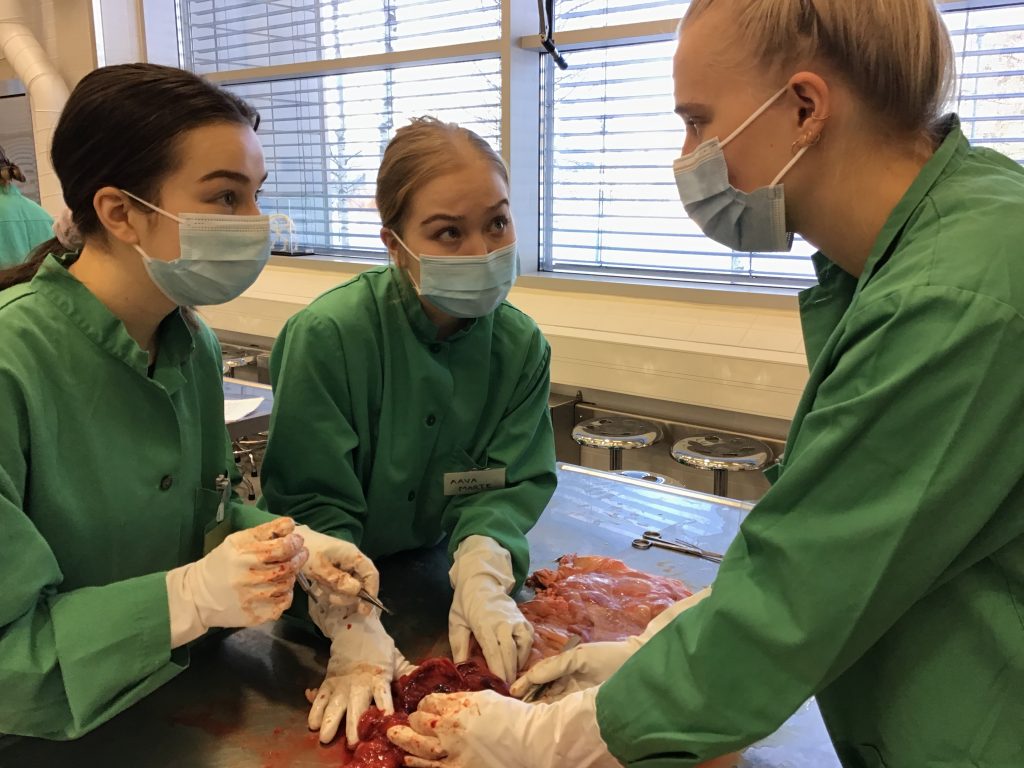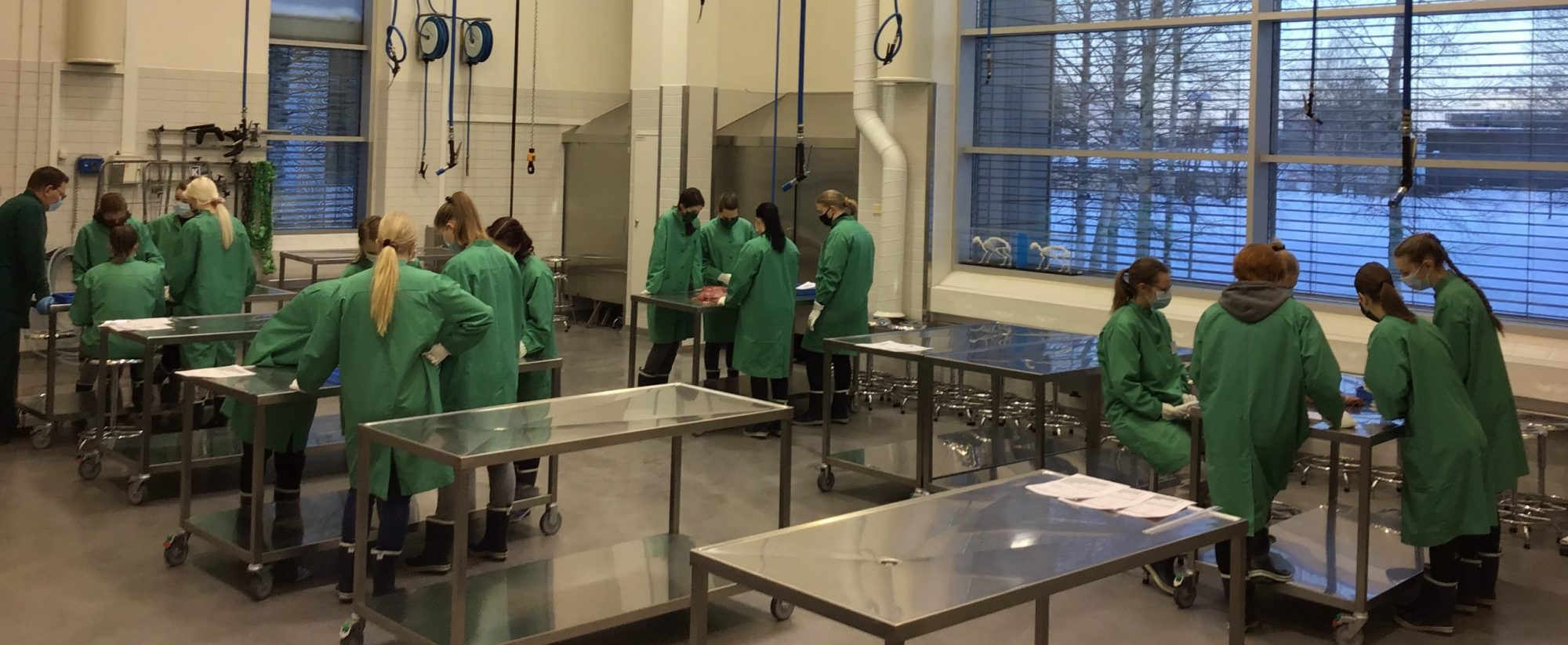A year of adaptation
The year began as planned, but all education activities were soon transformed by the Covid-19 pandemic. Although teachers and students had to adapt to remote instruction on short notice, the biggest upheaval affected the spring admissions process. Veterinary medicine is included in the nationwide cooperation in admissions to the medical fields, which means applicants take the same entrance examination as prospective students of medicine and dentistry. The entrance examination was planned in several stages, but eventually the partners decided to ensure that the admissions process could be carried out in the constantly changing circumstances by expanding the share of certificate-based admissions and organising the examination in two phases. The first phase was implemented as a remote examination using the electronic admissions platform for universities of applied sciences. The applicants who performed best were invited to take a traditional on-site examination. At the latter examination, safe distances were maintained between applicants even before they entered the building, and all applicants were first directed to a hand-washing station. Hand sanitiser was available throughout, and separate instructions were given for wearing protective face masks and gloves. Students’ answer sheets were also left untouched overnight before being sorted. The changes in the admissions procedure were criticised, but the Faculty’s highest priority in the new and serious situation was to protect the health and safety of everyone involved.
The instructions issued to prevent the spread of coronavirus had a significant effect on teaching and studying throughout the rest of the year. The diverse skills and flexibility of students and teachers were again noted when lectures were moved to an online environment on short notice, examinations were transferred to the Moodle platform and practical assignments were carried out or replaced with various creative solutions. The Faculty succeeded in implementing small group teaching for students completing clinical practice and practical examinations at the end of spring so that fifth-year students were able to be granted fixed-term practice rights as usual. Sixth-year students also graduated normally, but their graduation ceremonies were held online, and the traditional festivities were left to the graduates and their immediate family and friends.
A particular concern in the autumn related to the beginning of first-year students’ studies and their bonding in the exceptional circumstances. The Faculty contacted each first-year student towards the end of the autumn term to get a sense of how they were doing and whether they needed support. The traditional excursion of first-year students to the Faculty’s Saari unit just before Christmas also had to be moved online, but the students nevertheless felt that the event reinforced a spirit of inclusivity and community. The opportunity to get to know each other through their pets, who were also featured via video, received particular praise.
Although the situation was constantly changing, the Faculty was able to carry out many of the measures recorded in the implementation plan. One of the Faculty’s successes was the Swedish-language Strimma i veterinärmedicinsk svenska strand of studies, which has become consolidated as a part of the bachelor’s programme. The students who complete this optional strand have a more solid basis for using Swedish in their future professional duties. At the beginning of the autumn term, the degree programmes in veterinary medicine introduced a new model for student guidance and supervision, which aims to support studying and prepare students for employment. When the new model was being planned, a survey was sent to students to explore their needs and requests concerning guidance and supervision. Based on the feedback received, practices that had been found successful were included in the model and new procedures were developed. A new feature is the learning outcomes for academic specialist skills set for each year of study.
Teaching connected to the guidance and supervision model is integrated into courses compulsory for all students or shared guidance and supervision sessions. The guidance, supervision and support provided to students focus on the guidance and management of their own activities, communication and interaction skills, scientific thinking, and the recognition of their own expertise. In early-stage studies, the model focuses especially on the development of skills required for studying, time management and groupwork, while the focus in late-stage studies is on professional skills. In addition to joint guidance and supervision sessions, supervising teachers will continue to provide personal guidance to students at all stages of studies. As part of the new model, student progress will also be monitored with the aim of offering targeted support to students who have challenges in this area.
The degree programmes in veterinary medicine are actively involved in the European VetRepos project (‘A shared item repository for progress testing in European veterinary schools’), funded by the Erasmus+ programme, which is working on a set of questions for a progress test that supports the completion of veterinary studies. The three-year project has now been launched and is headed by the University of Copenhagen. The aim of the test is to help students develop their skills and learning habits, not to make value judgements on their skills. The accumulation and validation of a set of questions encompassing all veterinary education requires a great deal of effort. To formulate the questions, teachers from all the universities participating in the project are being trained, and the European Association of Establishments for Veterinary Education (EAEVE) is also contributing to quality assurance. The test measures students’ knowledge and skills developed throughout their degree programme and is taken several times during their studies. The enhancement of knowledge and skills is reflected in better test results as studies progress.
Mirja Ruohoniemi
Vice-dean for academic affairs
&
Antti Iivanainen and Riikka Keto-Timonen
Directors of the degree programmes in veterinary medicine
Faculty of Veterinary Medicine
University of Helsinki

